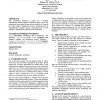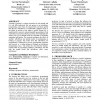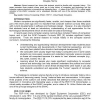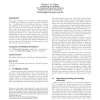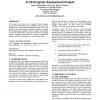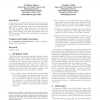109
click to vote
ITICSE
2004
ACM
15 years 7 months ago
2004
ACM
This presentation describes a project for a standard undergraduate human-computer interaction (HCI) course that incorporates issues related to users who are disabled. It is part o...
117
click to vote
ITICSE
2004
ACM
15 years 7 months ago
2004
ACM
Learning to program is a unique experience for each student, and it is not fully understood why one person in an introductory programming course learns to program better and more ...
109
click to vote
ITICSE
2004
ACM
15 years 7 months ago
2004
ACM
The use of generic and generative methods for the development and application of interactive educational software is a relatively unexplored area in industry and education. Advant...
ITICSE
2004
ACM
15 years 7 months ago
2004
ACM
: Recent research has shown that students should be familiar with computer history. This paper examines three projects whose goals are to bring history of computers and technology ...
121
click to vote
ITICSE
2004
ACM
15 years 7 months ago
2004
ACM
This paper describes an “experiential” learning approach to teaching a foundational course on Computer Networking. In additional to the traditional laboratory sessions and ana...
105
click to vote
ITICSE
2004
ACM
15 years 7 months ago
2004
ACM
Web technologies have become essential in the computing curricula. However, teaching a Web development course to computing students is challenging because of large bodies of knowl...
105
click to vote
ITICSE
2004
ACM
15 years 7 months ago
2004
ACM
In this paper, we present an assignment for a course on Design patterns at the masters level, where students have to adapt an existing program to meet additional requirements. We ...
ITICSE
2004
ACM
15 years 7 months ago
2004
ACM
In this paper, we describe our Computer Science Program Assessment (COMPASS) project. COMPASS uses open-source software tools to support the development and analysis of course por...
107
click to vote
ITICSE
2004
ACM
15 years 7 months ago
2004
ACM
In this paper we describe how XML can be introduced into a compiler construction course. We make the case that XML and compilers have much in common, and that introducing XML into...
ITICSE
2004
ACM
15 years 7 months ago
2004
ACM
Traditional blackboard-based lectures provide context on the sliding blackboards. Modern lectures incorporating video projectors typically do not provide this context. We describe...
